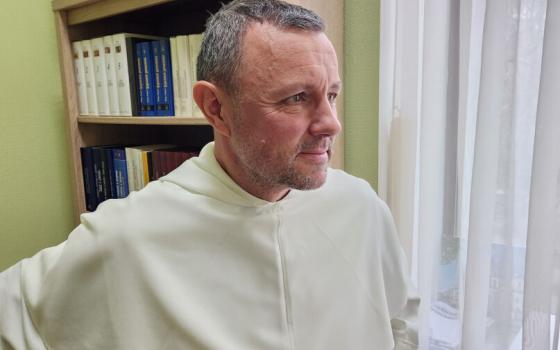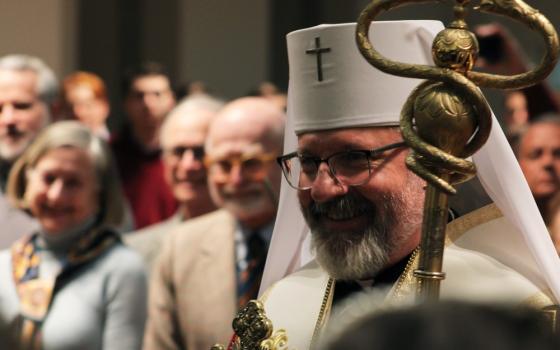
Analysis
PORTLAND, MAINE — After a campaign that saw significant Catholic activism on both sides of the issue, Maine voters rejected a law that would have allowed same-sex marriages.
Fifty-three percent of voters said yes to overturning a law passed by the state legislature and signed by the governor in May.
But in Washington state, it appeared that a referendum to uphold a law granting same-sex domestic partners the same rights as married spouses would be narrowly approved, 51 percent to 49 percent. The referendum had been opposed by Washington's Catholic bishops.
About 700 Maine Catholics signed either a newspaper ad or a declaration of support for same-sex marriage being circulated by the Portland-based Catholics for Marriage Equality.
Fifteen percent of Maine's population is Catholic, and Portland's Bishop Richard J. Malone was a visible and vocal leader in the campaign to repeal the law. The diocese gave as much as $550,000 to the effort. The Catholic fraternal organization, the Knights of Columbus, gave another $50,000 to the cause.
Malone starred in a video played in Catholic churches ahead of Election Day, and the archdiocese supplied seven weeks of bulletin inserts urging Catholics to overturn the law.
In a statement released the day after the vote, Malone thanked the people of Maine "for protecting and reaffirming their support for marriage as it has been understood for millennia by civilizations and religions around the world. …
"These past few months have served as a teaching opportunity to explain to parishioners and the wider community about how and why the church views and values marriage as the union of one man and one woman."
In a statement a day earlier, Malone chastised "a group of self-described Catholics who have chosen to dissent publicly from established Catholic doctrine on the nature of marriage as the union of one man and one woman."
Malone was writing about 140 people whose names appeared in a newspaper ad titled "Statement of Conscience by Maine Catholics Regarding Marriage Equality." Malone wrote, "A Catholic whose conscience has been properly formed by scripture and the teachings of the Catholic church cannot support same sex marriage."
But hundreds of Catholics disagreed with the bishop.
"It is a sad day, as the leaders of the Catholic church in Maine relish, in delight, that they have succeeded in keeping the homosexual families of Maine outside of the walls of society where they must beg to maintain their very existence, much like the lepers and blind in the Bible were kept outside the city walls in days of old," said Jack Dougherty of Eliot, Maine, a member of Catholics for Marriage Equality.
Portland attorney George Burns, who helped draft the Catholic statement on equality, said "The bishop won at a great price -- whether he cares about that price or not. He has divided his flock."
One Catholic, Pamella Starbird Beliveau of Lewiston, Maine, was removed as a lector and eucharistic minister after her pastor read an opinion piece she wrote for the local newspaper approving of same-sex marriage.
She told a rally outside the Portland cathedral Nov. 1, "I am sad but not surprised by what happened. … The Catholic church has every right to determine who can and cannot serve as ministers in the church. I respect that. We must keep our eyes focused on the issue and that is equality for our gay and lesbian citizens."
The Catholics supporting the legislation had tried to focus on the issue of civil equality. While the church's view of sacramental marriage — with its sacred rites — is one thing, civil marriage, which is a basic human and civil right, is quite another. These groups were well aware of these nuances in their advocacy for pro marriage-equality.
Their newspaper ad said in part: "We are Catholics who are concerned that the current political campaign to repeal Maine's civil marriage equality law is at odds with fundamental principles of truth and charity, and with vital American traditions of separation of church and state.
"We believe that the church has a right and often the responsibility to speak out on moral and social issues, to present its views, to seek to educate its member and others. But we also believe that the church should continue to recognize that Catholics are free, indeed obligated to follow their own informed consciences on such issues."
They were upset by statements from Malone like: "It is the doctrine of the Catholic church -- not my personal opinion — that all Catholics are obligated to oppose legal recognition of same-sex marriage."
The bishop's zeal in defeating marriage equality is "profoundly" misdirected, Burns said. The marriage law "is a civil matter."
Jesse Connolly, who managed the campaign against the referendum, tried to put an optimistic spin on the election results. "Hundreds of thousands of Maine voters stood for equality, but in the end, it wasn't enough."
"We're in this for the long haul," he said. "For next week, and next month, and next year-- until all Maine families are treated equally. Because in the end, this has always been about love and family and that will always be something worth fighting for."
Voters have rejected same-sex marriage in each of the 31 states where it has been on the ballot. Only five states currently allow same-sex marriages to be performed: Iowa, Connecticut, Massachusetts, New Hampshire and Vermont.
The coalition that opposed the Maine same-sex law saw the vote as a continuation of a nationwide campaign.
"The institution of marriage has been preserved in Maine and across the nation," declared Frank Schubert, a chief organizer for the winning side, Stand for Marriage Maine (www.standformarriage.org), quoted in the Portland Press Herald.
As in California's Proposition 8 campaign, which overturned same-sex marriage by amending the state's Constitution to ban gay marriage, the Schubert Flint public relations firm provided messaging fire power for TV and radio ads that hammered home a traditional marriage and family theme.
Stand for Marriage also played up fears that if the law were upheld, same-sex marriage and homosexuality would be taught in Maine's public schools, even though a month ago, the state's attorney general Jane Mills said that charge was unfounded.
"I have scoured Maine laws relating to the education of its children for any reference to marriage in the public school curricula," she wrote in a legal opinion. "I have found none."
Archbishop Joseph E. Kurtz of Louisville, Ky., chairman of the U.S. bishops' Ad Hoc Committee for the Defense of Marriage, praised the Maine vote in a statement released Nov. 4.
"Marriage is an institution which precedes all others, whether political or religious. It deserves the state's reinforcement and protection," Kurtz said. "The nature of marriage is written in the truth of who we are as human persons, as man and woman," he added. "One can say it is written not merely on our hearts, but in our very bodies."
Kurtz said, "Protecting marriage affirms the permanent and exclusive love between a husband and a wife as a wonderful and incomparable good in itself which also is of great social and practical consequence. ... Sadly, the attempts to redefine marriage today ignore or reject the unique identity and gifts of man and woman. Such a dismissal only fosters confusion about what it means to be human."
In the District of Columbia, the Catholic church and other backers of traditional marriage have lobbied the city's lawmakers and rallied to urge that citizens be able to vote on a same-sex marriage bill that is now being considered by the City Council and expected to be put to a final vote by members by the end of the year.
The district's charter forbids popular votes on laws that could be seen as restricting one's rights. All district laws that are passed are subject to review by Congress.
Reporting from Catholic News Service is included in this story.
[A frequent contributor to NCR, Chuck Colbert freelance journalist from Cambridge, Mass.]


